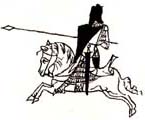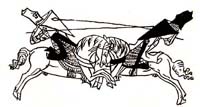 |
Polemics

 |
 |
His Excellency's Insinuations |
  |
Marian Therese Horvat, Ph.D.
Published in The Remnant, September 15, 2000
It is always difficult to answer the accusation of pride. One can argue, "No, I’m not proud", which is usually interpreted as a sure sign that you are. One can falsely agree, "Yes, you’re right", but this will not resolve anything, because it again vindicates the accuser. Moreover, this false humility is a proud position, because real humility is based on two principal attitudes, to be truthful and to be just. To pretend that one is humble and holy because one agrees with the accusation instead of rightfully defending the true and just position can be a sign of pride. Thus, the one accused of pride finds himself in a difficult position.
A person who rashly accuses others of being proud can also do this moved by pride, especially if he were to do so only to please his superiors, to guarantee his career or because he is afraid of what people are thinking and saying about him. That is to say, he might make the accusation to seek the esteem and honor of men, rather than the honor and glory of God. So said Our Lord Jesus Christin Scriptures: "How can ye believe in me, since ye seek to be honored of one another, and seek not the honor that is of God alone?" (John 5:44).
With a certain experience, a man could turn the tables on the accuser with the sameaccusation, as did Plato with Diogenes. Plato had invited various philosophers to dinner at his house and had prepared a lavish table and bedecked his house as befitted the dignity of the guests. Diogenes, upon entering, began to trample with his dirty feet the rich carpets that had been set out to receive the guests. "What are you doing?" asked Plato. Diogenes replied, "I am trampling on and bringing down the pomp and pride of Plato." Plato replied, "So you are, but with another pride", meaning that Diogenes was showing more pride in trampling on his carpets than himself in keeping such fine floor covering.
Insinuations and a grave accusation
However, the moment to philosophically parry would not be the present one. When lay men, who have respectfully and honestly laid out facts about the situation of the Catholic Church and humbly requested a dialogue with the religious authority, are being accused of pride by a Bishop, the matter is grave. I had the honor to be one of the four signers of the document We Resist You to the Face an open letter to Pope John Paul II respectfully expounding our doubts, asking for an explanation, and, until this comes, taking a position of resistance to the teachings and actions of His Holiness that are objectively contrary to the prior Catholic Magisterium. Far from putting ourselves above the teaching and judgment of the Church, we based our action on the perennial teaching of the Church itself, expressed by the words and examples of Saints, mainly of the Apostle St. Paul who resisted the first Pope, St. Peter, "to the face" (Gal. 2:11).
In the document we confessed our confusion about the new positions and attitudes assumed by religious authorities since Vatican II that conflict with the prior Magisterium. Ignoring this very serious presentation of the facts, the Bishop of Lincoln, Nebraska, Msgr. Fabian W. Bruskewitz launched against us, amid many insinuations, the accusation of pride. (Preface to "'Traditionalists,' Tradition, and Private Judgment", The Wanderer, June 22, 2000)
Pride springs from love of honors, Ven. Louis of Granada says in his Sinner’s Guide. However, certainly it was not a love for honors that motivated the signers of We Resist You to the Face, for we were well aware that from our action we could expect condemnations and unjust accusations rather than honors, awards, university positions, and much less invitations from the Vatican to be directors of international organizations. I believe that the same is true for those who have so nobly publicly defended, supported and circulated the Declaration of Resistance. They are not expecting to be invited to become Papal Knights or to hold places of honor in their local diocesan Catholic parishes and groups. Already, in their fights against liturgical abuses and dogmatic tendencies toward heresy, such Catholics have realized that they more easily could lose social standing, careers, friendships and even personal wealth than gain honors. But, I respectfully remind the Bishop from Nebraska, they are fighting the good fight to please Our Lord, not men.
Here, it seems opportune to comment on the common and mistaken belief that to question any religious authority is an indication of pride, a sign of placing oneself above the teachings of the Church. I know many ladies, including my mother, who were taught this. This is one reason they went along with innovations their instincts told them were wrong after Vatican II, when almost overnight the altars were turned around, popular devotions discontinued, lay councils set up, and the old hymns and Gregorian chant replaced by banal and vulgar music. After all, they were simple and humble lay women, raising families and organizing PTA groups and bake sales. How could they presume to know better than the authorities and learned theologians of the Church?
"A time to keep quiet and a time to speak"
However, different from this widespread erroneous notion, the Church affirms the words of Scriptures: "There is a time to keep quiet and time to speak." (Eccl. 3:7). Further, Our Lord warned us many times about false shepherds - supposedly ecclesiastics. In many passages of his works, St. Thomas Aquinas states the principle that the faithful can question and admonish Prelates. For example: "There being an imminent danger for the faith, Prelates must be questioned, even publicly, by their subjects." St. Augustine upholds this teaching, and adds that authorities, even the Pope, "should not reject a correction as unworthy even if it comes from their subjects." (We Resist You to the Face, book, Chap.V, 4, p. 56)
If Msgr. Bruskewitz had wanted to make a serious response to our Statement, he could have analyzed these and other examples of the teachings of the Saints and Doctors of the Church who recommend publicreprimands when authorities give scandal to the faithful. (Ibid. pp. 56-8; see also Atila Sinke Guimaraes, In the Murky
Waters of Vatican II, Intro., § 6, f. 3) Following the logic of the Bishop of Lincoln, these Saints and Doctors also would have to be proud.
If he were seeking historical examples, he could refer to the two articles by Atila Sinke Guimaraes: "Resistance: Historical Precedents" and "Lessons from the Past."(ibid., pp. 157-167). Let me add the cases of St. Bridget of Sweden and St. Catherine of Sienna, two outstanding women who did not hesitate to resist and even reproach the Holy Father - in severe and no uncertain terms - to end the Avignon occupancy and put a close to the public scandal he was causing. Would they also be proud, according to criteria of His Excellency?
In our Declaration of Resistance we clearly stated that we did not imply the desire to judge the Pope, but only to courteously compare his teaching with the prior Magisterium of the other Popes and of the Church. (V. 3, p. 56) It seems thatit would have been fair for the Bishop to have paid us an analogous courtesy
and withheld judgment on us without first expounding his reasons. Instead he hastily made the venomous insinuations of pride.
One last observation. For those who might like to see more tar and feathers flying in this defense, I admit that, even though I am trying to be logical, some of the more feminine tactic of insinuation is present in this article. This is difficult for me to avoid, given my feminine nature that naturally tends toward this kind of defense. What is hard for me to understand is why His Excellency avoided using the manly direct approach with logical reasoning in his piece, but instead employed the same method of insinuations.
Next Article

Other Articles in the Polemic
 Some Presuppositions Some Presuppositions
Presuppositions and context of the controversy
 The Bishop's Preface The Bishop's Preface
Bishop Fabian W. Bruskewitz
 Anecdotes, Trajectories & Headaches: A Letter to Bishop Bruskewitz Anecdotes, Trajectories & Headaches: A Letter to Bishop Bruskewitz
Jonathan Tuttle
 Five Questions for Msgr. Bruskewitz Five Questions for Msgr. Bruskewitz
Atila Sinke Guimarães
 An Apology to Atila Guimarães and
Marian Horvat An Apology to Atila Guimarães and
Marian Horvat
Stephen Hand


|
Polemics | Home | News | Books | CDs | Search | Contact Us

© 2002-
Tradition in Action, Inc. All Rights Reserved
|
 |
|
